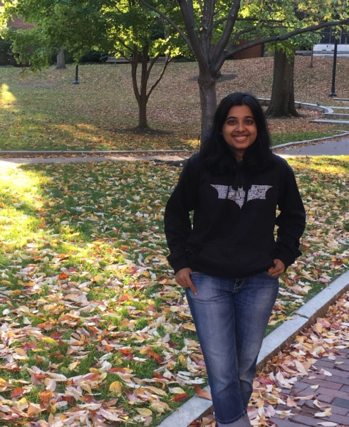Shveta Gupta: Voices of Penn Engineering Master’s Alumni
This is part of our series of articles written by Penn Engineering alums about their experiences at Penn and how it shaped their lives. Our next article is by Shveta Gupta, who graduated with a master’s in Electrical Engineering in 2018. She is now at Intel, working as a firmware engineer.

As a recent graduate, I look back at the time I spent at Penn and can hardly believe it went by so fast. I can’t begin to count the different experiences I had in the past two years. Prior to beginning my studies, I had heard that the master’s journey at Penn is tough but that would be an understatement to say the least.
Before coming to Penn, I had work experience in firmware development, but I decided to delve deeper into the field of hardware/software co-design for embedded systems. This field deals with understanding and designing all aspects of a product, from the physical mechanisms to the digital brains of the system. As such, Penn’s master’s in Electrical Engineering was my first choice.
As I was joining the Electrical and Systems Engineering department, I was looking to grab the best opportunities while adjusting to a new environment at Penn. I remembered hearing that Siddharth Deliwala, the manager of ESE laboratories, was the “go-to” person in the department for any kind of advice. I made one of the best decisions by simply walking into the lab and speaking to Sid on my very first day, as over the next two years I saw ESE’s Detkin Lab become my second home.
I joined the lab as a part-time employee, with my title varying from “lab support staff” to “lab engineer” and finally “lab superstar” by the time I graduated. I, along with my colleagues, ran the lab as if it were our own. My responsibilities included designing lab-based lessons for undergraduate and graduate-level courses in the department, maintaining inventory and ensuring all equipment worked well, assisting departmental professors in conducting lab-based courses out of the Detkin lab and making sure the lab was open to all ESE students and faculty for academic and personal projects.
Over the course of two years, I realized how the Detkin Lab is the heart and soul of the department. A major reason for this is the way that Sid has been managing the lab for over two decades. Though he was technically my boss, I prefer to call him my mentor, as I have lost track of the number of times he helped me with advice, be it academic, professional or personal. Like me, a number of ESE graduate and undergraduate students considered the Detkin lab their home and Detkin employees their family because Sid ensured that students felt welcomed in the lab.
Even though I was pursuing a master’s in EE, my interests led me to take courses from the Computer and Information Science department as well, giving me good exposure to both hardware and software aspects of embedded system design. My three favorite courses at Penn were System-On-Chip Design, Internet of Things and Operating Systems Design. I especially liked the flexibility provided by Penn to take courses out of one’s own department, and I am glad I could take full advantage of that.
One of the most common questions I get asked is regarding the job search process at Penn. I can only speak for the embedded systems field, but I have to admit that my job search was stressful and tedious. However, I received an offer from Intel towards the end of my third semester after a consistent search that I started at the beginning of my second year. The rigorous coursework at Penn definitely prepared me well for interviews, though the distance from the West Coast (where most of the companies in the embedded systems field are based) was an additional challenge when it came to approaching companies. Nonetheless, I would definitely like to emphasize the prestige that Penn carries in industry, as just the name of the school turned a few heads at Intel when I went for my interview. This Ivy League name is something I will definitely wear with pride forever.
Though life at Penn revolved around homework submissions, exams and project deadlines, I was able to have fun in my work. The academic rigor meant waiting for vacations to explore the beautiful city of Philadelphia, ordering food on campus rather than enjoying a home-cooked meal, and many a time, sleeping on campus rather than in the comfort of my own bed. Nevertheless, it was these all-nighters, late-night trips to get coffee from 24/7 stores, taking advantage of any free food on campus, and finding the perfect spots to sleep and never giving up, that made grad life memorable. To sum it up, life at Penn is tough and not for everyone, but at the end of two years, it was worth it!
A word of advice that I can offer is that, more than anything, find a good group of people with similar interests to work with from the start. Someone once told me that you should choose your project partner more carefully than your life partner, and there is some truth in that! My grad life would have been completely different without my friends — really, my family — at Penn. We lived together, struggled together and survived because of one another.
Finally, as I walked the graduation walk, received my hard-earned degree while my parents watched proudly, and embarked upon a new journey at Intel, I did it knowing I would keep those two years in my heart, even as I took the next step toward making new memories.
